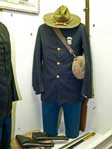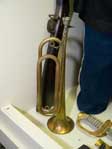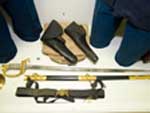It is generally agreed that the cause of this war was what is described as the atrocities of the Spaniards against the Cuban population. Some would say that these atrocities were "exaggerated" by the press, driving American sentiment to become involved in their plight.
The conflict began after the sinking of the American battleship, the USS Maine and deaths of 266 men in February of 1898 as the ship sat in Havana's harbor. Although there is no clear defined evidence of what really caused the explosion on the ship, an accident or a Spanish mine, most blamed the Spaniards and their lack of control of the harbor.
Vermont Sen. Redfield Proctor made a speech in March of 1898 to the U.S. Senate describing the deplorable conditions the Cubans were living in. Senator Proctor had served as the "Secretary of War" under President Benjamin Harrison and was considered to be very influential in military matters.
This conflict was declared a war by congress on 20 April, 1898 and fought through 1898 until the official signing of the peace treaty, the "Treaty of Peace," also known as "The Treaty of Paris," on Dec. 10 1898 in Paris. The treaty was ratified by the United States Congress on Feb. 2, 1899.
As a result of this war the United States gained control of the Spanish colonies of the Philippines, Guam and Puerto Rico.
While Vermont Soldiers did not see combat, they endured warfare of a different sort, battling disease and low morale. Writing to the Vermont General Assembly in 1929, Brig. Gen. Herbert T. Johnson, the adjutant general, said this:
"The First Vermont Volunteers did not see battle but did experience indescribable misery through the Nation's neglect. I am certain the Regiment would have preferred, yes, welcomed, battle to the suffering, heat, poor water, typhoid fever, dysentery, disgusting food, and lack of medical equipment at Chickamauga. Vivid, undimmed by the years, is my memory of the suffering of the sick, their courageous fights to live, and the despair of those trying to aid them. All honor to them and to those men of Vermont who went stoically about their duties, half sick, through that terrible experience. Soldiers true, all of them."
Other notable Vermonters serving in the Spanish-American War included Admiral of the Navy George Dewey, the Navy's only five-star admiral, and Navy Capt. Charles E. Clark, who sailed the USS Oregon 14,000 miles from San Francisco, around the tip of South America, to rendezvous with the American fleet near Cuba.






